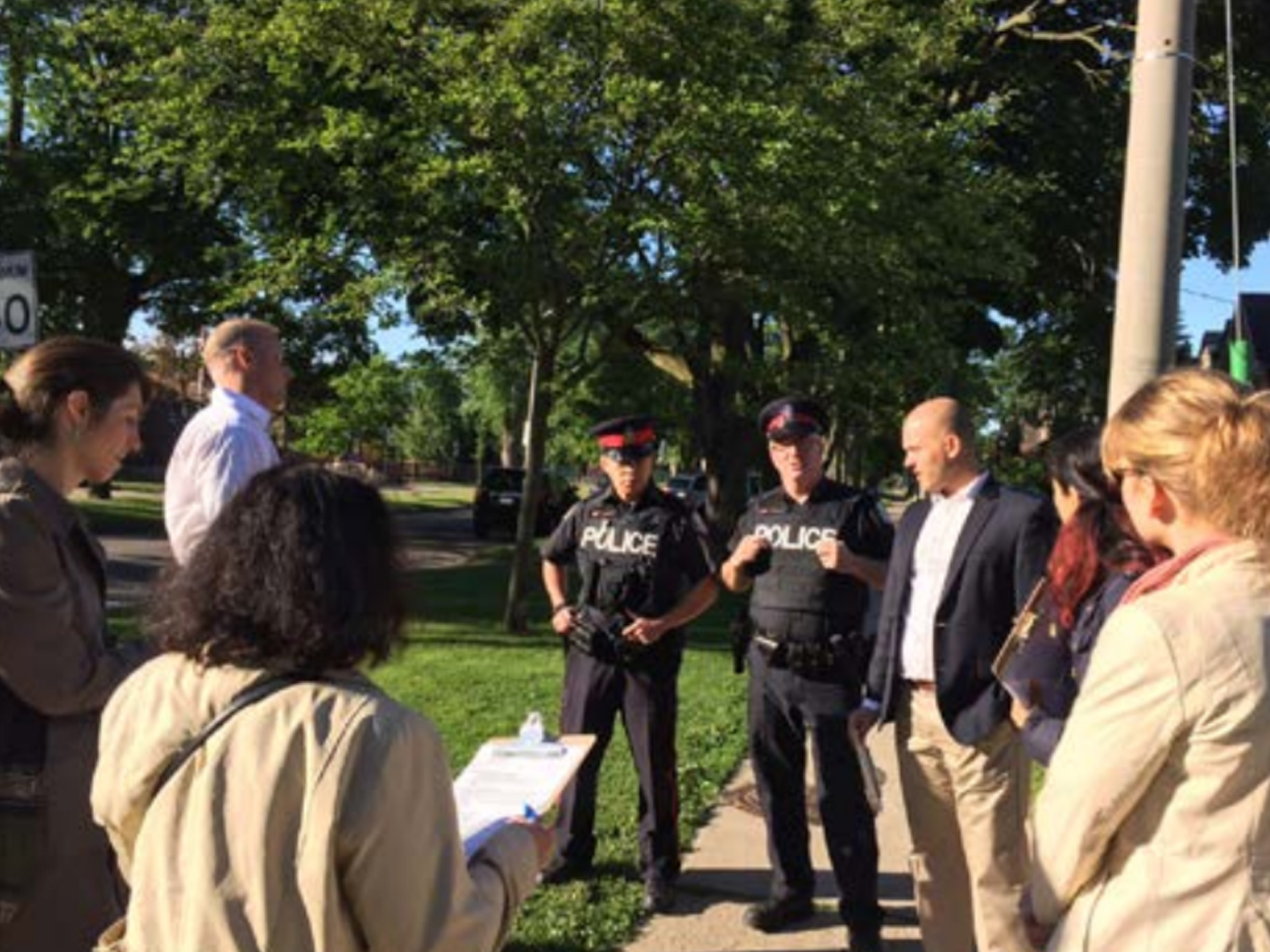Phase 2 : Évaluer les conditions de base
La seconde phase de la PTS est une collecte de données qui permettent d’identifier et de comprendre les enjeux locaux en matière de transport scolaire. Ces données fournissent également une base de référence pour mesurer les progrès tout au long du processus de PTS.

Outils :
Obtenir l’approbation d’un comité d’éthique de conseil scolaire pour effectuer une collecte de données de PTS:
Effectuer un sondage sur les modes de transport des élèves:
- Sondage sur les modes de transport des élèves
- Outil de saisie des données du sondage des élèves (en anglais)
Effectuer un sondage sur les habitudes de transport des familles:
- Sondage auprès des familles
- Demander un lien vers le Sondage en ligne auprès des familles
Évaluer le milieu bâti et la circulation routière:
- Observation de la circulation : directives et formulaire
- Exemple de rapport de comptage de la circulation (en anglais)
- Tour à pied du quartier : directives et liste de contrôle
- Rapport de tour à pied : exemple no 1 (en anglais)
- Rapport de tour à pied : exemple no 2 (en anglais)
- Tour à vélo : directives et liste de contrôle
Articuler une vision et établir des objectifs pour l’école:
Communiquer les résultats à la communauté scolaire:
Our Steering Committee
The ASTC Steering Committee is coordinated by organizations across the country, including Green Communities Canada, Urban Systems Ltd, Urbanthinkers, and Capital Regional District.

Jamie Hilland (he/him)
Sustainable Transportation and Healthy Communities Specialist - Urban Systems Ltd.
Since 2015, Jamie has worked extensively in the realm of Active School Travel, leading the development of numerous local, regional, and national studies. Jamie is the current Chair of the Canadian Active Transportation Alliance and sits on the Expert Advisory panel of the CIHR funded CHASE (Child Active Transport Safety and the Environment) study at the University of Calgary, the Policy Committee for the Association of Pedestrian and Bicycling Professionals (APBP), and the Mobility Management Committee for the Transportation Association of Canada (TAC).
He holds a Bachelor’s degree in Sociology from the University of Winnipeg, an IAP2 Foundations certificate from the International Association of Public Participation, and is a member candidate for the Canadian Institute of Planners.

Laura Hube (she/her)
Planning Assistant, Regional and Strategic Planning – Capital Regional District
Laura is a lifelong learner and authentic relationship builder who seeks to create happier and healthier communities for all. Since completing her Master’s degree in Urban and Regional Planning, Laura has worked in the private, public, and not-for-profit sector across Canada and the US. In recent years, Laura led a Pilot funded by the BC Ministry of Transportation and Infrastructure, empowering school communities across British Columbia to engage in active and sustainable school travel using an asset-based approach with an equity lens. She currently supports policy planning, reporting, and implementation initiatives related to regional transportation and growth management at the Capital Regional District. Her portfolio includes supporting the CRD’s annual Active School Travel Planning initiative, Ready Step Roll. Laura believes that the journey to/from school is a ripe opportunity for adventure, activity, and autonomy.
In her spare time, Laura enjoys toting her kids around Victoria on their cargo bike, discovering the best in local food, and curling up with a good book.

Arthur Orsini (he/him)
PhD Student - Faculty of Health Sciences, Simon Fraser University
Arthur Orsini began working on sustainable transportation programs in 1996 and has international experience with a focus on community and youth engagement. He was Canada’s first ever School Travel Planner after doing that work in Auckland in 2005-06. Beyond New Zealand, he has led school travel planning and youth leadership training in seven provinces, five US states and across Australia. Arthur has never owned a car and frequently wears a jacket and tie while cycling. He is currently a PhD student whose research aims to understand: "Can student-action clubs reduce car-trips to high school, and reduce climate anxiety amongst students?".

Nicole Roach (she/her)
Sustainable Mobility Director - Green Communities Canada
Nicole holds an undergraduate degree in Philosophy and Communications from McMaster University and a Masters of Sustainability Science, Policy, and Society from Maastricht University. She has worked in the field of sustainable transportation for several years, with a focus on commuting behaviours, community outreach, and children’s mobility. Nicole manages the sustainable mobility programming at Green Communities Canada, overseeing School Travel Planning, the Canadian Electric School Bus Alliance (CESBA) and other initiatives.
In her spare time, Nicole enjoys exploring cities by bicycle, urban photography, and cooking at home.

Xuedan Xu (she/her)
Sustainable Mobility Lead - Green Communities Canada
Xuedan is a graduate from the University of British Columbia and holds a Bachelor of Science in Natural Resources Conservation. Upon graduating, she began her career with Green Communities Canada, having supported the coordination of various sustainable mobility initiatives, including School Travel Planning, seasonal active transportation campaigns, and the national school travel data collection pilot project. Currently, Xuedan leads the National Active School Streets Initiative, a 4-year program that will implement up to 40 School Streets projects in 25 communities across Canada. Prior to her work with Green Communities Canada, Xuedan has worked at municipalities, and other not-for-profit organizations with the goal to improve equity and accessibility of community engagement initiatives.
In her spare time, Xuedan enjoys backpacking through BC’s beautiful mountains, running, and sewing.
Join our Contact List
Get in touch with a request to join at activeschooltravelcanada@gmail.com and via Twitter @ActiveSchoolTC.

À propos de nous
Green Communities Canada (GCC) est une association nationale à but non lucratif qui réunit des organismes environnementaux communautaires luttant ensemble pour un avenir dynamique, équitable et durable.
Depuis plus de deux décennies, GCC joue un rôle de chef de file dans la promotion des modes de déplacements scolaires actifs, grâce à ses activités de recherche, à sa défense des intérêts et à ses programmes de formation, auxquels s’ajoutent ressources éducatives, partenariats, événements et programmes concrets.
Notre objectif en ce qui a trait au transport scolaire est simple mais convaincant : de faire en sorte que la marche, le cyclisme et les autres modes de transport actif, sécuritaire et durable deviennent la norme pour les déplacements scolaires.
Le site Web DeplacementScolaire.ca a été réalisé grâce à un soutien financier du gouvernement de l’Ontario.

